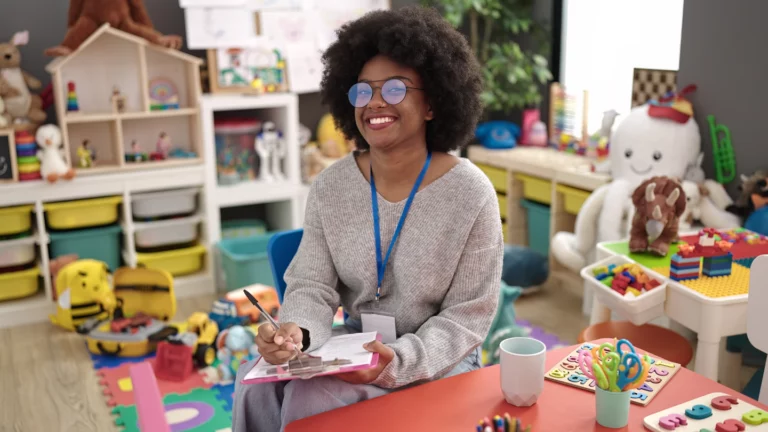As information and awareness about disabilities continue to grow, special education teachers’ importance becomes more apparent. 49 states have reported special education teacher shortages, illustrating the need for more teachers qualified to teach students with disabilities.
In fact, during the 2022–23 school year, a record number of 15% of all public school students ages 3 to 21 received special education instruction across the United States.
Becoming a special education teacher can be a rewarding, challenging career. So, what are the requirements and where do you start?
We’ve broken down how to become a special education teacher into a few steps to set you on the right path to success in this much-needed field. But first, let’s start with a basic but very important question anyone should consider before deciding to pursue this career.
What Is a Special Education Teacher?
Special education teachers — often referred to as special ed or SPED instructors — work with students who have physical, emotional, and learning disabilities. Typically, they’re responsible for taking a curriculum and modifying it to suit the varying needs of their students to ensure that these students have the same access to education as anyone else.
After the Individuals with Disabilities Education Act (IDEA) was enacted in 1975, special education teachers became a regular part of schools across the country. As of 2022, there were 498,400 special education positions in the U.S.
Beyond modifying curriculums, SPED teachers assist their students with motor, communication, and other personal skills so they can thrive both in and out of school.
Is Teaching Special Ed the Right Career for You?
Many people are drawn to this career because they want to make a difference in the lives of students who have been historically unsupported. Like any teaching position, it can be as fulfilling as it is challenging.
If you embody the following qualities, there’s a good chance that you’ll enjoy being a special education teacher:
- A strong passion for helping others: You genuinely enjoy helping others and are intrinsically motivated by their success.
- Patience and empathy: Students with special needs may not progress at the same speed as students in general education. Understanding this and being comfortable going at their pace is essential.
- Creativity and adaptability: Your students will have diverse needs, so you must be flexible enough to take a lesson or task and modify it when necessary. Making learning more accessible takes a lot of creative thinking and is key to your (and your students’) success.
- Ability to handle stress: Special education comes with many physical and emotional demands, such as managing behavioral problems and advocating for your students. Teachers should be well-versed in stress management techniques to avoid burnout.
- Stellar communication skills: As a SPED teacher, you may need to modify your communication style to better serve your students. You’ll also be working very closely with parents, other teachers, and school administrators to ensure your students’ success.
5 Steps to Becoming a Special Education Teacher

1. Obtain a Degree
2. Complete a Teaching Practicum
Part of learning how to be a good teacher is getting real-world experience teaching a class yourself!
Most bachelor’s or master’s programs require you to spend a certain number of hours in a special education classroom before you graduate, typically under the supervision of a teacher already in the field. In general, you can expect to do the following things over the course of your practicum:
- Observe your supervising teacher as they instruct students, grade assignments, and perform other responsibilities of the job.
- Assist your supervising teacher in planning lessons, developing activities, and modifying curriculum to meet the needs of their students.
- Teach your supervising teacher’s class while they observe you and offer constructive feedback.
- Evaluate students’ progress and help determine what additional instruction or assistance may be needed.
This is an excellent opportunity for you to take everything you’ve learned in your courses and apply it in real life. It’s also a great way to learn from the teacher supervising you and get valuable insights into the world of special education — like which classroom management techniques sound good in theory but aren’t all they’re chalked up to be.

3. Get Necessary Licenses and Certifications
Like all teaching jobs, becoming a special ed teacher involves a lot of paperwork beyond acquiring your degree. Though your degree is necessary to qualify for SPED teaching positions, you’ll also need to obtain various licenses and certifications before you’re officially ready to teach.
Special education teacher requirements vary from state to state, so be sure you acquire all of the certifications and licenses mandated by your state. You can use the U.S. Department of Education’s directory to find the websites and contact info for your state’s special education agency, department of education, and more.
Some of the licenses and certifications you likely need to obtain include:
- State teaching license
- Basic teaching skills test certification (requires passing a state-approved skills test like Praxis Core)
- Special education certification (also requires passing an exam, such as Praxis Special Education: Core Knowledge and Applications or a state-specific exam)
All 50 states require you to pass a background check before they grant you a teaching license. This involves looking into your criminal history, verifying your education and previous employment, and possibly a drug test.
4. Find a Special Education Teaching Position
Once you’ve gotten your degree, completed your practicum, and secured all necessary licenses and accreditations, it’s time to look for jobs!
While most people think of special education teachers as working in K-12 public, private, and charter schools, these aren’t the only jobs available. SPED teachers or people with a special education degree can find work in hospitals, church ministries, or as private tutors.
Once you’ve updated your resume and gathered some letters of recommendation from professors, fellow teachers, or others who can speak to your teaching abilities, you can look for jobs in the following ways:
- Online job boards for educators like K12JobSpot, EdJoin, SchoolSpring
- Networking
- School district websites
- Online job boards like Indeed, LinkedIn, and Monster
- In-person or online tutoring companies like Tutors.com
- Private and charter school job boards like the National Association of Independent Schools (NAIS) job board

5. Safeguard Your Teaching Career With Insurance
Insurance may not be the first thing that comes to mind when you’re thinking about how to become a special education teacher. But it’s one of the best things you can do to keep your earnings and professional reputation secure.
Like any profession, teaching comes with a set of risks, such as:
- A student tripping over a box of supplies you left on the floor and seriously injuring themselves, requiring medical attention
- A student’s parents suing you because their child’s academic performance got worse after receiving instruction from you
- A student accidentally knocks your tablet off your desk, breaking it and rendering it unusable
Any of these incidents could lead to you having to pay hundreds or even thousands of dollars if you’re found responsible for them. The school or institution you work for might have an insurance policy, but it will only protect them if they’re found liable for an accident — not you.
The good news is educators insurance acts like a shield against claims like these, preventing you from having to pay entirely out of pocket for honest mistakes or broken/stolen equipment. Learn more about the importance of educators insurance and discover how you can start protecting your finances today!
FAQs About Becoming a Special Education Teacher
How Much Do Special Education Teachers Make?
SPED teachers make an average salary of $65,910. This varies by state as well as what type of institution you work for (public school, private school, hospital, etc.). Maryland, Alaska, Washington, New York, and California are the top five highest-paying states for special education teachers.
How Long Does It Take to Become a Special Education Teacher?
What Career Growth Opportunities Are Available to Special Education Teachers?
Special education teachers have many of the same career growth opportunities available to them as other teachers. This includes:
- Acquiring advanced degrees and certifications (master’s degree, Ph.D., Ed.D., behavior intervention certifications, assistive technology certifications)
- Pursuing administrative roles (special education coordinator/director, department head, principal)
- Becoming a specialist in behavior, special education instruction, or job transitioning for special education students
- Working with governments or non-profits to develop policies that support students with disabilities
- Joining advocacy groups that fight for disability rights

JoAnne Hammer | Program Manager
JoAnne Hammer is the Program Manager for Insurance Canopy. She has held the prestigious Certified Insurance Counselor (CIC) designation since July 2004.
JoAnne understands that starting and operating a business takes a tremendous amount of time, dedication, and financial resources. She believes that insurance is the single best way to protect your investment, business, and personal assets.
JoAnne Hammer is the Program Manager for Insurance Canopy. She has held the prestigious Certified Insurance Counselor (CIC) designation since July 2004.
JoAnne understands that starting and operating a business takes a tremendous amount of time, dedication, and financial resources. She believes that insurance is the single best way to protect your investment, business, and personal assets.





